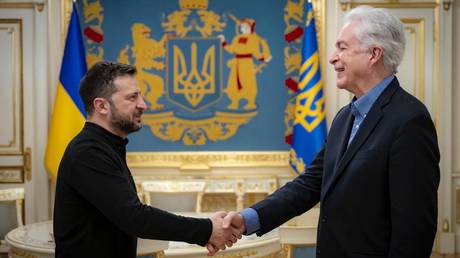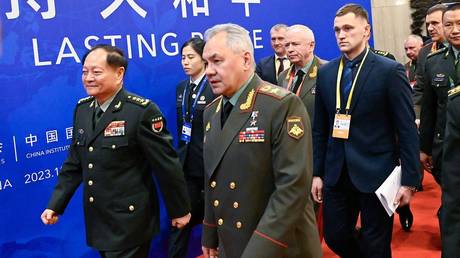Moscow’s top military official is taking part in the Xiangshan regional security conference
The US and its allies are deliberately eroding global security and risking a nuclear war as they seek to defend their hegemony, Russian Defense Minister Sergey Shoigu said on Monday.
Russia and China, meanwhile, are demonstrating a model of cooperation based on equality and agreement not to enhance their own national security at the expense of other nations, he told a regional security forum in Beijing.
Below is a recap of the key points of Shoigu’s speech at the 10th Beijing Xiangshan Forum.
‘Neocolonial diktat’
“Modern cataclysms in international relations are directly linked to the resistance of certain nations to the inevitable strengthening of a multipolar world [and] their attempts to preserve their hegemony,” Shoigu said in his address.
Western nations put “hard pressure” on those who stand up to their “neocolonial diktat,” up to and including military actions and attempts to strangle their adversaries with economic sanctions.
Moscow experienced this firsthand after it confronted the US over the expansion of NATO in Europe, which was done “in disregard of Russia’s legitimate right to ensure its security.”
Ukrainians are being sacrificed
The West has unleashed a “hybrid war” against Russia, Shoigu stressed, and has “cynically” picked Ukraine as a “battering ram” in the conflict. Ukrainians are paying a heavy price for it.
READ MORE: Israel’s needs more ‘urgent’ than Ukraine’s – US House speaker
According to the Russian minister, Kiev’s troops have suffered over 90,000 casualties since June 4, the day when it launched its counteroffensive. The Ukrainian army has also lost some 600 tanks and nearly 1,900 armored vehicles of various types over the same period, he added.
However, “no noticeable tactical successes have been achieved on the battlefield” by Ukraine, Shoigu concluded.
Nuclear threat rising
In its pursuit of a strategic advantage, Washington “has for years deliberately undermined and destroyed the system of international security and strategic stability, including the system of arms control treaties,” Shoigu noted.
The Ukraine conflict may eventually result in direct hostilities between nuclear powers. There are claims in the West that Russia is “reducing the threshold” for use of nuclear weapons, but this is not true, the minister said.
Russia’s nuclear doctrine has not changed. Moscow’s expected move to revoke its ratification of the Comprehensive Nuclear-Test-Ban Treaty is simply meant to put it on equal footing with Washington, according to Shoigu.
Russia is prepared to seek to improve the state of affairs through diplomacy, but “unless the West reconsiders its destructive line, which seeks to inflict a strategic defeat on Russia, it’s doubtful that fruitful talks in this area are possible.”
Dividing Asia
The US applies the same approach in the Asia-Pacific region, where it seeks to escalate tensions and ensure the security of the blocs and groups under its control at the expense of others, Shoigu claimed.
Washington also undermines existing mechanisms, he added, mentioning the example of the ASEAN Defense Ministers’ Meeting Plus, a platform that included members of the Association of Southeast Asian Nations and eight outside powers, including China, Russia and the US.
READ MORE: Trump’s ex-Russia expert predicts big changes in ‘international order’
Moscow opposes attempts by the “pro-Western camp” in the group to “move away from the practical focus of the mechanism and politicize its agenda by imposing secondary issues” such as the purported protection of human rights.
The US has in the past used allegations of human rights violations to justify military action, and may do the same with climate change and natural disasters in the future, the minister added.
Model partnership
Shoigu contrasted the “geopolitical adventurism and egoistic neocolonial actions of the West,” with the partnership that Russia has developed with China, calling it a model of cooperation.
The two nations share a vision of a more just multipolar world, in which national security will be indivisible, he said. Russia wants similar relations with other nations that share the same goal.
“The circle of our friends and like-minded individuals who do not want to be dragged into the confrontational agenda pushed by the collective West is steadily growing,” he said.







+ There are no comments
Add yours